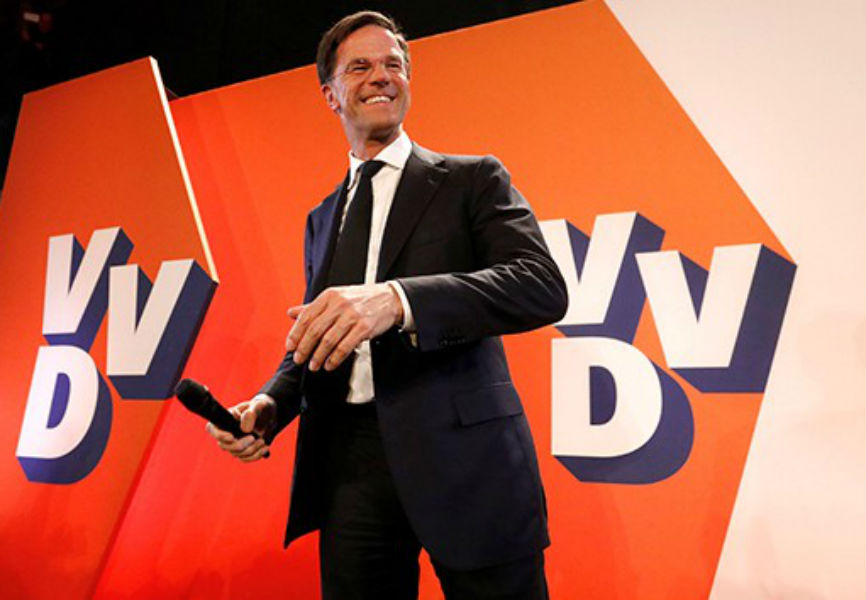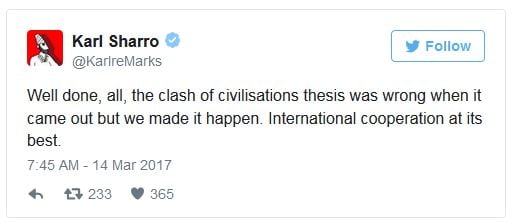


Meanwhile, in Nigeria, Muhammadu Buhari has resumed the presidency, officially chairing his first cabinet meeting Wednesday after two months in London, thereby ending concerns about government stability. Still, his absence from the leadership of Africa's largest economy remains mysterious. Although he told lawmakers he had never been so sick before, his office called his time abroad a “vacation, during which he had medical check-ups.” Feel free to try that excuse at your own place of work, and let us know how it goes.
In U.S. foreign policy, as Secretary of State Rex Tillerson makes his first trip to Asia, the State Department has dropped the term “pivot” or “rebal
ancing” to Asia, saying it doesn't know what, if anything, the administration will call its Asia policy. There has been a long-standing debate about whether the pivot was just a brand name or an actual policy shift, which won't be settled any time soon. Either way, it generated endless headlines about whether the “pivot is dead.” That debate, at least, needed to be mercy-killed. Assuming Trump sticks to his branding principles, we should be starting the endless debates about whether “America First” is dead sometime around mid-2018.
Self-Promotion Interlude: Watch EG's chairman, Cliff Kupchan, discuss the outlook for geopolitics and markets in 2017.
Turkish President Recep Tayyip Erdogan ruffled a few feathers this week by calling everyone who offended him a Nazi. But as Godwin's Law decrees, invoking the Nazis is the easy way out. Here are a few world leaders who took the time to make a slightly more creative insult.
5. Polish Prime Minister Beata Szydlo. Last week, Poland's current government tried to block a former Polish prime minister from renewing his term in a senior EU position. The government's objections were overruled by the rest of the EU's leaders, including French President Francois Hollande, who warned the EU could withhold funds from Poland if they didn't stop pursuing reforms perceived as anti-liberal. The Polish PM responded by lashing out at Hollande's approval ratings: “Am I supposed to take seriously the blackmail of a president who has a 4% approval rating and who soon won't be president?”
4. China's State Council. Every year, the U.S. State Department issues a report documenting human rights violations worldwide. China does not appreciate the attention. In its own annual tradition, it throws the report back in America's face. This year, it got particularly creative, with words so poetic they belong in a Trump inaugural. “With the gunshots lingering in people's ears behind the Statue of Liberty, worsening racial discrimination and the election farce dominated by money politics, the self-proclaimed human rights defender has exposed its human rights 'myth' with its own deeds.” North Korea also piled on, remarking in its own response to the U.S. report, “'health insurance' has become a legal tool for emptying the people's purses.”
3. German Vice Chancellor Sigmar Gabriel. While everyone else goes around comparing Germans to Nazis, the Germans have been getting down to business. When informed that Donald Trump had complained that Germans weren't buying American cars, Gabriel hit back with what qualifies for a sick burn in German politics. How can the U.S. get into the German market? “The U.S. needs to build better cars.”
2. Russian Defense Minister Sergey Shoigu. After the U.K. warned Russia against “sticking its paws” in Libya, where Russian forces have recently been spotted, Russia's defense minister opted to extend the animal metaphors. “What do they [UK] have on their coat of arms? A lion, I guess. There is an old saying: all lions are felines, but not all felines are lions.” Someone isn't a fan of Larry the Cat.
1. Philippine President Rodrigo Duterte. Duterte is like a reverse Michelle Obama. When his opponents go high, he goes low. After the European Parliament criticized his government for the human toll of its drug war, Duterte literally raised his middle finger and offered a choice four-letter word to the EU: “F*ck you.” But lest Europeans feel singled out, Duterte has also told Singapore and the United Nations to F themselves.
Your Weekly Bremmer
Watch the World in 60 Seconds from San Francisco.
European Roundup: EG's Mij Rahman on What to Expect in Europe
Q: Is Francois Fillon's candidacy dead?
A: Yes, Francois Fillon's candidacy is basically dead. He is completely discredited and cannot even turn out his own base. There is a small chance he can still make it into the runoff by default because he can rely on the core center-right vote, which is roughly 20 percent. And that Macron himself might not make it into the second round because his base is actually untested and the support we're seeing in the polls — although consolidating — doesn't translate on the 23rd of April.
Q: What is a “hard Brexit,” and is that where we're headed?
A: A “hard Brexit” means that the United Kingdom will control not accept free movement of labor from the European Union, and that the U.K. will be outside the jurisdiction of the European Court of Justice. Both mean it will no longer be a member of the Single Market. This is the trajectory the government is currently on. UK economic operators will still trade with the Single Market, but the quality of that trade and the costs surrounding it will be higher.
Q: Will Scotland hold another independence referendum?
A: Yes, I think they will. It will likely be at the end of Brexit negotiations in 2019.
Read the full interview on Eurasia Live
Hard Numbers
19 years have passed since Pakistan's last national census. That changes this week.
Zero dollars were paid in ransom to Somalia pirates who made the first major capture since 2012. The ship was released after gunfire was exchanged and a former British army officer made the pirates “an offer they could not refuse.”
5,000 people or more have been freed from Boko Haram since January in operations conducted by Cameroon and Nigeria.
$1 million to $2.5 million is earned annually a year by companies selling or renting so-called zero-day software vulnerabilities to governments intent on exploiting them.
One week is all it took for the Trump administration to surpass the Obama administration's total use of airstrikes in Yemen in any year of its tenure.
50 hours passed between former South Korean President Park Geun-hye's expulsion by the court and when she actually left the Blue House.
“We want a staircase for all, not a ladder for the few.”
– British Labor leader Jeremy Corbyn, who knows exactly what the masses want: staircases.
Signal is written by Matt Peterson (@mattbpete) with editorial support from Gabe Lipton (@gflipton). Don't like what you read? Feel free to yell at us on Twitter or just reply to this email.